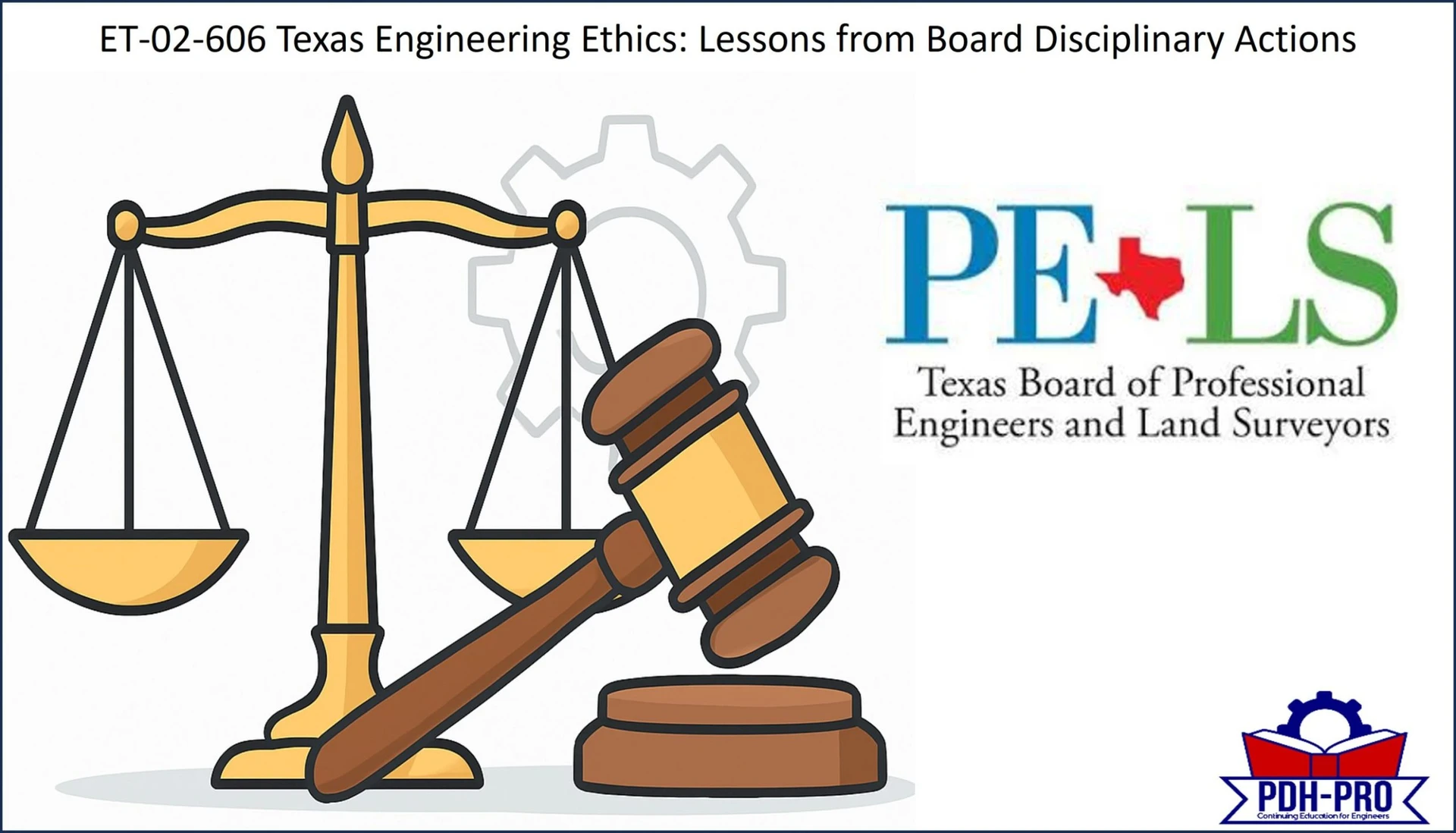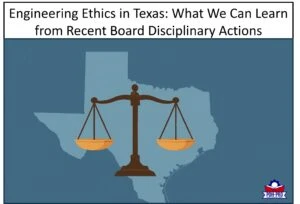Written by: Jordan Ellis, PE
Published: May 29, 2025 | Updated: November 20, 2025
As licensed engineers, we carry more than just technical responsibilities. We’re trusted stewards of public safety. That trust hinges on our ability to practice with integrity, sound judgment, and respect for the laws that govern our profession.
In Texas, the engineering board regularly reviews disciplinary cases to hold practitioners accountable and ensure the profession upholds its ethical standards. I recently reviewed a series of board decisions from 2024 and 2025, and the findings were eye-opening. From sealing violations to unlicensed practice and failures to disclose out-of-state discipline, the cases show just how easy it can be to slip up – and how serious the consequences can be. Texas case outcomes frequently reflect the same risk categories highlighted in the board trends in professional engineer disciplinary actions resource, underscoring persistent gaps in compliance and professional accountability.
This article highlights key patterns in those board rulings. My goal isn’t to point fingers, but to offer a practical look at what went wrong and what we can all learn from it. If you’re a Texas P.E. or working toward licensure, this summary might help you stay on the right side of the line.
Related articles:
What are the Most Common Ethics Violations for Professional Engineers
Case Study: A Multi-State Ethics Violation and Its Consequences
Engineering Ethics in Practice: A 10-Year Review of Disciplinary Actions in New York (2016–2025)
Florida PE Disciplinary Cases: Lessons from Recent Board Actions
Ethics Course for Texas Engineers

This one-hour online course provides Texas Professional Engineers with a clear understanding of their ethical and legal responsibilities under the Texas Engineering Practice Act and TBPELS rules while earning guaranteed PDH credit. Using real Texas disciplinary cases, it highlights common violations and offers practical strategies for maintaining compliance and upholding professional standards. Ideal for engineers seeking to strengthen their ethical practice and meet continuing education requirements in Texas.
Overview of Disciplinary Activity
The Texas Board of Professional Engineers and Land Surveyors (TBPELS) reviewed and ruled on dozens of disciplinary cases in the 2024-2025 period. While each case had its nuances, several clear themes emerged in terms of the types of violations and the penalties imposed.
Out of the reviewed cases, the most common violations involved:
- Improper use of seal – placing a professional engineer’s seal on documents not prepared under the engineer’s direct supervision.
- Unlicensed practice – offering or performing engineering services without a valid license or firm registration.
- Failure to respond or cooperate with the Board – ignoring Board inquiries, failing to respond to notices, or not appearing at scheduled hearings.
- Failure to report out-of-state discipline – neglecting to inform the Texas Board of disciplinary actions taken by other states, which is a reportable offense under TBPELS rules.
- False or misleading statements – submitting renewal applications or firm registrations with incorrect or deceptive information.
In total, 23 engineers and firms faced formal disciplinary actions. The range of penalties was significant – from reprimands and fines to license revocations and cease-and-desist orders. The vast majority of the violations were preventable, often stemming from paperwork lapses, poor communication, or a misunderstanding of licensure requirements.
While these cases are sobering, they serve as reminders that our responsibilities as engineers extend beyond calculations and drawings. Ethical conduct and regulatory compliance are just as critical to maintaining the public trust – and our licenses. Some of the ethical themes seen in Texas closely resemble those found in lessons from West Virginia PE license cases, particularly around the accuracy and completeness of engineering documents.
References:
https://pels.texas.gov/downloads/enf/da/2025/da-05-15-2025.pdf
https://pels.texas.gov/downloads/enf/da/2025/da-02-13-2025.pdf
https://pels.texas.gov/downloads/enf/da/2024/da-11-14-2024.pdf
https://pels.texas.gov/downloads/enf/da/2024/da-08-08-2024.pdf
https://pels.texas.gov/downloads/enf/da/2024/da-05-16-2024.pdf
https://pels.texas.gov/downloads/enf/da/2024/da-02-15-2024.pdf
Types of Violations and Trends
After reviewing the latest TBPELS disciplinary actions, several patterns stand out, many of which align with broader trends we’ve seen across other states. In Texas, however, the volume and variety of cases make for an especially clear lens into how and why engineers land in front of the Board.
1. Improper Use of Seal
This continues to be one of the most frequent violations. Engineers placed their seal on documents they didn’t prepare or directly supervise – sometimes to expedite work, sometimes under pressure from employers or clients. The Board makes it clear: sealing a document is a declaration of responsible charge. Shortcutting that responsibility undermines the integrity of the profession.
2. Unlicensed Practice and Firm Compliance
In many cases, individuals or companies offered engineering services without the proper license or failed to maintain an active firm registration. A few violations stemmed from engineers assuming their licenses were still valid or from firms expanding services without first checking registration requirements.
3. Failure to Report Discipline or Respond
The Texas Board takes transparency seriously. Engineers who were sanctioned in other states – and failed to report those actions to TBPELS – were penalized again in Texas. Others faced action simply for not responding to Board correspondence or failing to appear when summoned. Inaction is viewed as a serious ethical breach.
4. Continuing Education Shortfalls
Texas requires licensed engineers to complete continuing education annually. Several cases involved engineers who could not provide documentation or whose CEU claims were unsupported. These lapses, while preventable, reflect a broader issue of underestimating administrative requirements.
5. Fraud and Misrepresentation
Although less common, a few cases involved deliberate misrepresentation – such as submitting false information on renewals or forging signatures. These violations received some of the harshest penalties, including license revocation and steep fines.
The following table categorizes the types of violations cited in the recent Texas PE Board disciplinary actions.
Table 1: Common Types of Ethics Violations in Texas (2024–2025)
| Violation Category | Description | Number of Cases | Percentage |
| Improper Use of Seal | Sealing documents not prepared under direct supervision | 8 | 26% |
| Unlicensed Practice | Offering engineering services without a valid license or firm registration | 6 | 19% |
| Failure to Report/Respond | Not disclosing discipline in other states or ignoring Board communications | 5 | 16% |
| CE Non-Compliance | Failure to meet continuing education requirements or provide documentation | 4 | 13% |
| Fraud or Misrepresentation | Submitting false documents, forged signatures, or inaccurate renewal statements | 3 | 10% |
| Other | Minor infractions or board order violations not falling into main categories | 5 | 16% |
| Total | 31 | 100% |
This breakdown reflects not just regulatory priorities, but also recurring areas of confusion or neglect among license holders.
Comparing Texas enforcement patterns with Ohio PE disciplinary actions and compliance tips reveals shared concerns about timely reporting and adherence to statutory requirements.
Penalties Imposed: A Measured but Firm Response
The Texas Board doesn’t take shortcuts when it comes to enforcement – but they’re also not looking to destroy careers over honest mistakes. The penalties imposed reflect a balanced approach: accountability without excessive punishment. Still, for engineers who ignore board orders or intentionally mislead regulators, the consequences are severe.
Below is a breakdown of the types of penalties issued, based on the cases reviewed from 2024 and 2025:
Table 2: Types of Penalties Issued by the Texas PE Board (2024–2025)
| Penalty Type | Description | Number of Cases | Percentage |
| Administrative Fine | Monetary penalties ranging from $500 to $5,000 | 28 | 90% |
| Reprimand | Formal written warning placed on record | 20 | 65% |
| Ethics/Rules Coursework | Mandatory completion of Board-approved ethics and law courses | 15 | 48% |
| License Suspension | Temporary suspension due to severe or repeated violations | 4 | 13% |
| License Revocation | Permanent removal of licensure (e.g., egregious misconduct, repeated offenses) | 2 | 6% |
| Voluntary License Surrender | Engineer agreed to surrender license in lieu of further discipline | 1 | 3% |
Most cases included multiple penalties – fines paired with coursework, or reprimands with license probation. A clear trend emerges: the Board is more lenient when engineers cooperate and take corrective steps. However, evasion, false statements, and unlicensed practice are met with little tolerance.
Lessons from the Field: Practical Takeaways for Engineers
If there’s one thing these cases make clear, it’s this: ethics violations aren’t always dramatic or malicious. Many start with something as simple as a missed continuing education deadline, forgetting to update a business address, or incorrectly sealing a set of plans. But left uncorrected – or worse, ignored when the Board comes knocking – these small issues can spiral into formal disciplinary actions that follow you for years.
As practicing engineers, we should treat licensure not as a formality, but as a commitment. Here are a few practical reminders drawn straight from the recent Texas enforcement decisions:
- Stay current on CEUs: Every reporting cycle, confirm you’ve met the continuing education requirements—and be prepared to show your certificates if audited.
- Double-check your seal use: If your name is on it, you’re responsible. That includes ensuring responsible charge and supervision of the work.
- Respond to the Board: Ghosting the Board, even for something minor, only escalates the situation. Professionalism includes responsiveness.
- Avoid unlicensed practice: Working in Texas without a license, or helping a firm do so, is one of the quickest ways to get sanctioned.
- Take corrective action seriously: If you’re cited, comply quickly and fully. Doing so often results in reduced penalties.
Ultimately, the Texas Board isn’t trying to trip anyone up. But they are holding us to a high standard – for good reason. When public safety is involved, the margin for error is thin, and our obligations as licensed engineers go beyond just technical competence.
Final Thoughts: Ethics Is the Foundation of Engineering Practice
The cases reviewed here from the Texas Board of Professional Engineers and Land Surveyors are more than just enforcement actions – they’re cautionary tales. Each one reminds us that the public’s trust in our profession hinges on more than calculations and code compliance. It depends on our integrity, honesty, and commitment to professional responsibility.
Whether the issue is sealing work outside your expertise, failing to renew a license, or not responding to the Board, the outcome is the same: erosion of trust, reputational damage, and disciplinary consequences that could have been avoided.
As licensed engineers, we owe it to our clients, our profession, and ourselves to stay sharp – not only technically, but ethically. Staying proactive, transparent, and engaged with our regulatory obligations isn’t just good practice. It’s the foundation of what it means to be a professional engineer.

